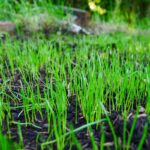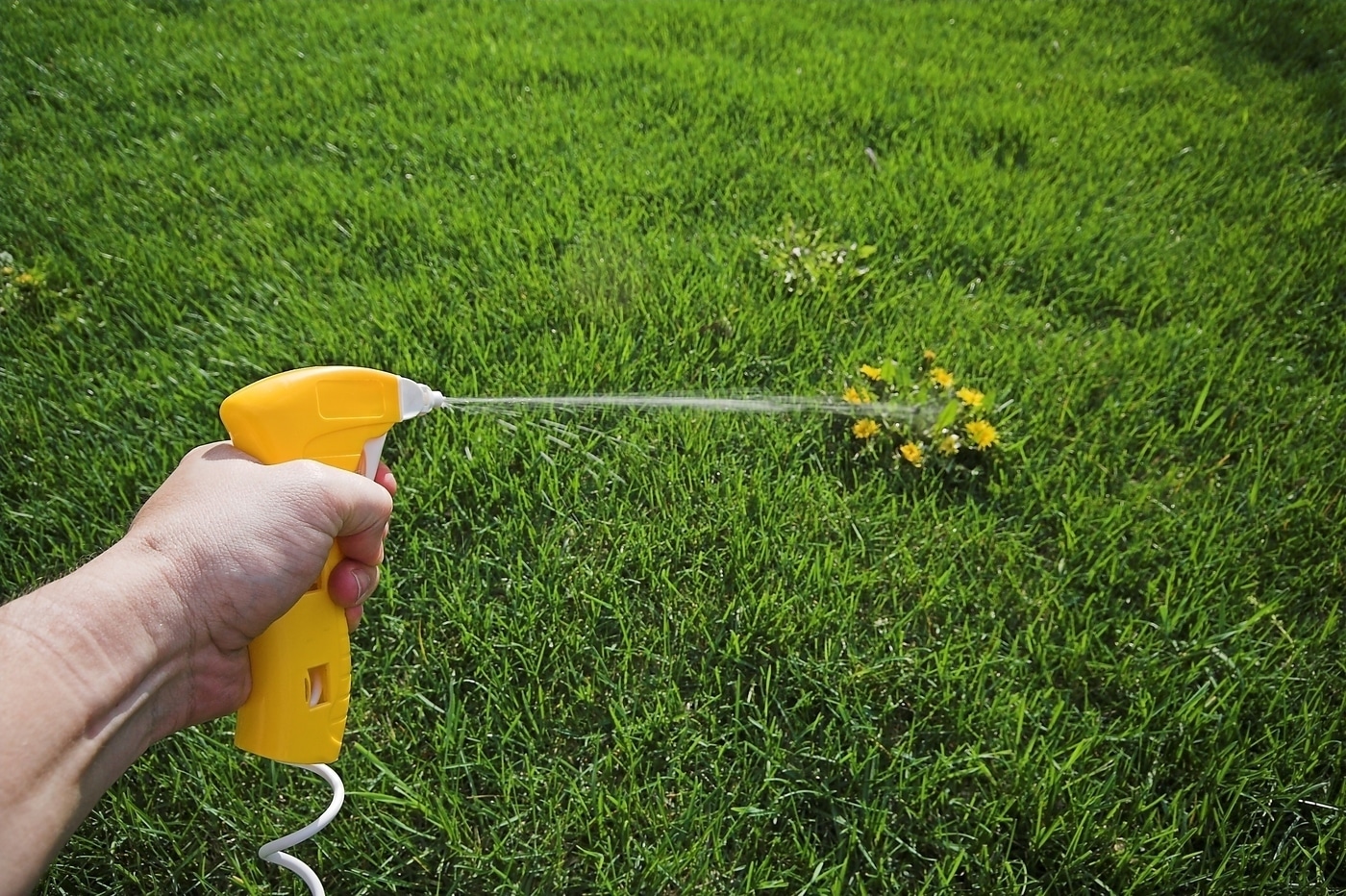
Organic herbicides offer a natural alternative to conventional products. They use plant- or mineral-based components to control unwanted weeds and vegetation.
Natural weed killers use active ingredients such as acetic acid, citric acid, or essential oils to target weeds in eco-friendly ways. They work by desiccating plant cells, disrupting cellular membranes, or inhibiting root formation, making them sustainable lawn care solutions.
As a plant and soil scientist and a homeowner of 20-plus years, I have experience with all types of herbicides. I’ll share my insights and how I tackled a dandelion and thistle invasion.
Organic Herbicides List
While the market is saturated with conventional herbicides, it offers significantly fewer organic herbicides. If you’re looking to implement eco-friendly weed control in your yard, the following list includes some of the best organic weed killer products on the market.
What Are Organic Herbicides?
To understand organic herbicides, it’s best to first understand herbicides in general.
Herbicides are chemical compounds used to kill or inhibit the growth of unwanted weeds. These products are classified as organic or inorganic based on the compounds they contain.
Organic herbicides are designed to control vegetation without using synthetic chemicals as active ingredients. Organic weed control products rely on naturally occurring actives, making them ideal for eco-friendly lawn care.
Inorganic herbicides use synthetic chemicals to kill weeds or other plants. Compared to organic herbicides, conventional products may pose more risks.
Note: Even though organic herbicides are made from naturally occurring components, they aren’t without dangers. All herbicides pose risks to the applicator, surrounding plants, soil health, and nearby water sources when misapplied. Regardless of your product, always take appropriate safety precautions and follow label directions.
How Do Organic Herbicides Work?
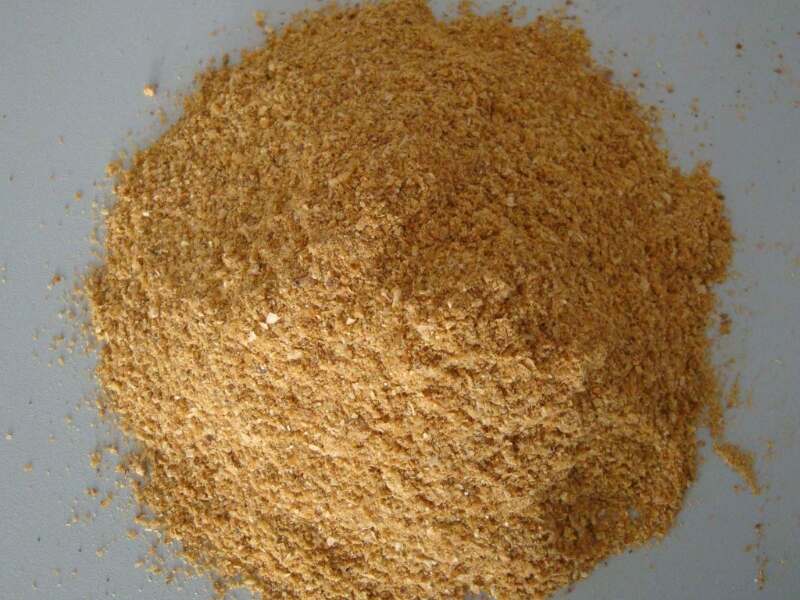
Photo Credit: Phu Thinh Co / Flickr / CC BY-SA 2.0
At the fundamental level, natural weed killers use plant- or mineral-based active ingredients to disrupt biological processes within the cells of targeted plants, thereby affecting growth and killing vegetation.
Organic Herbicide Active Ingredients
The National Pesticide Information Center claims hundreds of different herbicides are available for agricultural, horticultural, landscape, or garden settings. Unfortunately, the list of approved organic herbicides represents only a small percentage of the available products because they contain fewer natural, active ingredients that effectively harm plants.
The products available contain the following common active ingredients:
- Herbicidal soaps containing long-chain fatty acids
- Acetic acid
- Citric acid
- D-limonene, a common terpene found naturally in citrus peels
- Essential oils such as clove, summer savory, cinnamon, and red thyme
- Chelated iron (effective against broadleaf weeds but leaves grass alone)
- Corn gluten meal (most common pre-emergent organic product)
Note: To give you an idea of the organic market size globally, in 2023, the herbicide industry was valued at $32.2 billion. Of that, the organic herbicide global market was valued at $1.2 billion, a mere 3.7%.
What’s the story behind corn gluten meal?
Dr. Nick Christians of Iowa State University discovered corn gluten meal’s weed-killing properties while researching a pathogen found on golf course turf. The corn-milling byproduct inhibits root formation of broadleaf weeds, (e.g., dandelions), and grassy weeds, (e.g., crabgrass), and was patented as a natural pre-emergent herbicide in the early 1990s. However, it works better in some climates than in others.
See Related:
How Organic Herbicides Work in Plants
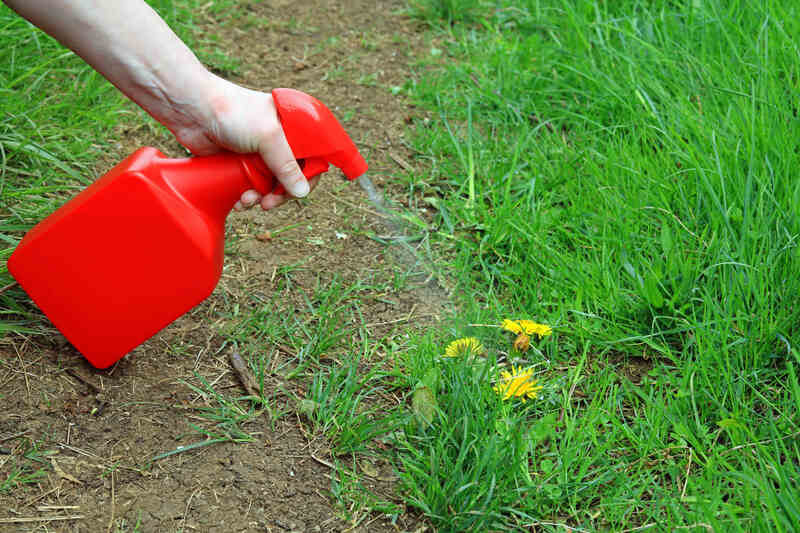
Once applied, natural weed killers work in several ways, depending on their active ingredient(s).
- Cell Membrane Disruption: Some products break down or rupture plant cell walls, leading to rapid dehydration or cellular collapse as fluids leak out.
- Include clove oil-based, vinegar-based, and fatty acid-based herbicides.
- Works best for young weeds in full sun, and quick top kill.
- Desiccation: Some products damage the waxy cuticle on plant leaves or directly draw moisture from the plant, causing it to dry out and die.
- Include citric acid-based and salt-based herbicides.
- Works best for long-term weed suppression, but salts may affect soil health negatively.
- Pre-Emergent Root Inhibition: Some products prevent root formation in newly germinated seeds, keeping weeds from emerging through the soil surface.
- Includes corn gluten meal.
- Works best for preventing persistent lawn weeds like dandelions and crabgrass.
- Oxidative Stress: Some active ingredients cause oxidative harm to cells, damaging their proteins, lipids, or DNA. This damage causes cellular dysfunction, impairing the weed’s growth.
- Includes chelated iron (FeHEDTA).
- Works best for broadleaf weeds like dandelions and clover but won’t harm the grass.
See Related:
Types of Organic Herbicides
Herbicides are categorized based on when they are applied and how their active ingredients affect plants. Understanding the differences can help you choose the best herbicide for your yard and garden.
Pre-Emergent vs. Post-Emergent Herbicides
Organic herbicides for weeds can be pre-emergent or post-emergent, based on when they are used.
- Pre-emergent products prevent weed seeds from sprouting through the soil surface, stopping a weed problem before it starts. Their active ingredient is a mitotic inhibitor, which halts cellular division and inhibits the growth of the root, shoot, or both.
- Post-emergent weed killer targets weeds that are actively growing above the soil surface.
See Related:
- What Are Pre-Emergent Herbicides?
- Types of Post-Emergent Herbicides
- Applying Post-Emergent Herbicides to Your Lawn
Contact vs. Systemic Herbicides
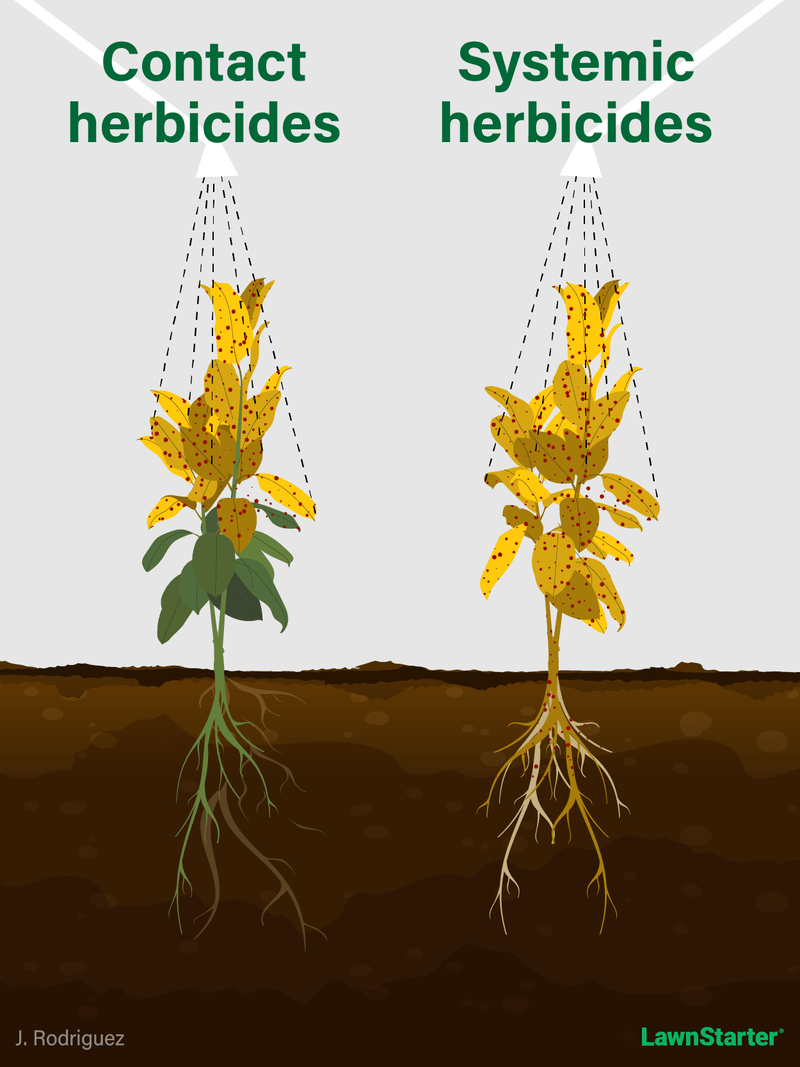
Herbicides come in two major classes — contact and systemic — based on how they affect plant tissues.
- Contact herbicides disrupt biological processes in the plant tissues they contact. They tend to work quickly but, in most cases, need repeated applications to kill the entire plant.
- Systemic herbicides disrupt the biological process throughout the plant, including the roots. After the applied product is absorbed into the plant tissues, the weed’s vascular system carries the herbicide from the shoots to the root system, killing the entire plant.
Note: Organic herbicides are typically contact herbicides, so it’s important to coat the entire weed when applying the product.
Selective vs. Non-Selective Herbicides
Lastly, herbicides are categorized by the type(s) of plants they affect.
- Selective herbicides target specific types of plants while leaving others unharmed. Usually, these products affect broadleaf weeds while leaving grass alone to help maintain a weed-free lawn.
- Non-selective herbicides kill anything they touch, including desired vegetation. They are best for total vegetation control in driveways, sidewalks, or garden beds.
Note: Most organic products, besides those with chelated iron, are non-selective, so careful application is key.
See Related: Reasons Why Weeds Grow in Your Lawn
Homemade Organic Weed Killers
Sometimes, something gets in the way, and you must take a DIY route. Fortunately, you can make your own organic weed killer for lawns and gardens if you can’t find a product or your budget won’t allow you to buy one.
Vinegar
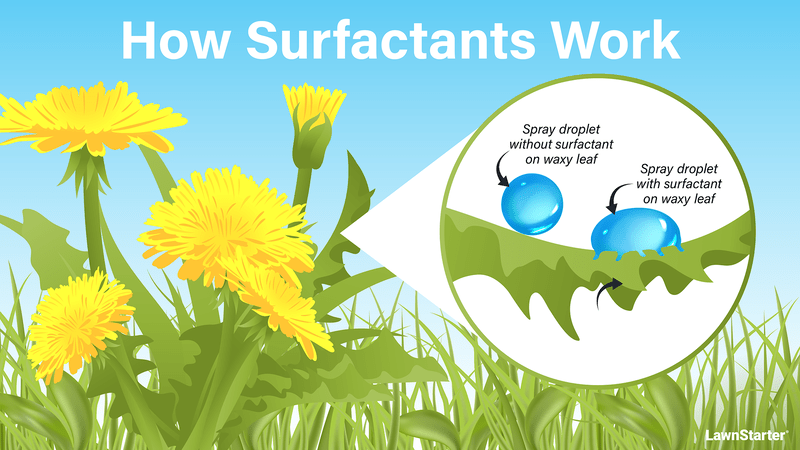
Acetic acid was mentioned in the active ingredients list. So, one would think that the vinegar in your kitchen cabinet or pantry is the perfect solution to the weeds in your lawn or garden. However, it’s not that straightforward.
While some claim kitchen vinegar (~5% acetic acid) works fabulously to kill weeds, there is little science behind the claims. When it comes down to it, the acetic acid concentration isn’t high enough to do much damage. The research supporting acetic acid as a weed killer shows the best results with 20% acetic acid concentration on broadleaf weeds versus grassy weeds.
My Experience: I’ve tried dumping straight vinegar on thistles in my yard, and it barely browns the edges. It’s far from being a wonder product. This isn’t to say, though, that the vinegar bottle in your kitchen is useless!
If you want to use vinegar in your kitchen, your best bet is to make a homemade weed killer with vinegar, rubbing alcohol, salt, and dish soap. Salt and rubbing alcohol help dry out the weeds, and the soap acts as a surfactant, making the liquid stick to the foliage, making it more effective.
For a more effective homemade organic weed killer or a product to use directly on weeds, buy horticultural vinegar with a higher concentration of acetic acid. Retailers sell products with a concentration of 20% to 45% or 50%.
Using Vinegar Safely
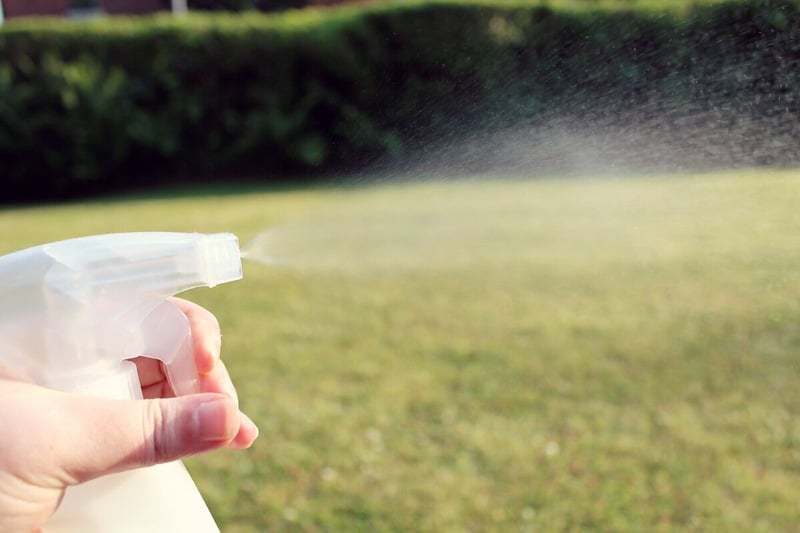
However, if you do buy something more potent, it’s important to heed caution! Acetic acid at such high concentrations is a dangerous chemical. Vinegar with more than 11% acetic acid can cause blindness and burn your skin, so follow all safety recommendations when using.
Acetic acid is a prime example of an organic treatment being more acutely toxic than synthetic herbicides, and care must be demonstrated when using it.
Karey Windbiel-Rojas, Associate Director for Urban & Community IPM/Area Urban IPM Advisor, has extensively researched the efficacy and safety of organic herbicides in urban landscapes. “While organic, 20% acetic acid is very toxic,” says Windbiel-Rojas, “so the applicator must wear more personal protective equipment than with some other herbicides.”
See Related: Does Vinegar Kill Weeds?
Boiling Water
For the most natural approach, look no further than your faucet. If you can boil water, you have a simple DIY organic weed killer within your reach. Boiling water works well on young, small weeds and is an excellent treatment choice for patios and driveways. Pour the water directly — and carefully — on the weeds so you don’t burn yourself or kill the wrong plants.
Tips for Using Organic Herbicides
Organic herbicides present challenges that are not found in inorganic products, so keep the following in mind:
- Many organic products do not have residual effects, so reapplications may be necessary for best results.
- Use it in conjunction with hand weeding or other integrated pest (e.g., weed) management methods for the best results.
- Organic herbicides are typically contact herbicides, so you must cover the entire plant when applying.
- Use a fine mist setting on your backpack weed sprayer to coat the weed evenly.
- Add dish soap to help the product stick to the leaves better.
- Be aware that perennial weed plants have a more remarkable ability to recover than annuals, even if a herbicide is applied well.
- The best time to apply is when temperatures are above 65 degrees Fahrenheit on a sunny day.
- Treat weeds as soon as you see them. Organic herbicides work better on smaller, immature weeds than mature, bigger plants. Thomas Lanini of the University of California found the best results at the cotyledon or first true leaf stage.
- Apply in the morning or early afternoon to give the product time to work before evening moisture.
- Wait a few days after mowing to make sure there is enough leaf surface for the product to be effective.
See Related: Lawn Mowing Tips: How to Mow a Lawn the Right Way
FAQ About Organic Herbicides
I’ve been asked this question frequently, and I don’t think there is a straightforward answer. As a plant and soil scientist and a homeowner, I believe that both types of products have advantages that make them better in certain regards but also disadvantages. Personally, I use a mix of organic and inorganic lawn care products on my lawn and garden.
Organic products are better if you’re looking for a sustainable lawn care approach. As they’re made from natural ingredients, they are more environmentally benign. However, this means they are typically not as strong. In turn, they may not be as effective and require more applications — and each application increases inherent risks. They can also come with a higher initial cost that goes up with each application.
Conventional products often work much quicker and offer more complete weed control. In some cases, this makes them a better choice. My backyard is prone to a serious dandelion and thistle infestation (there’s a massive field behind my fence). Organic products barely dent the problem, no matter the herbicides I’ve tried. The only way to keep both weeds under control is to use conventional, synthetic products.
Organic herbicides may show visible effects a few hours after application, depending on the herbicide’s active ingredient, the type of weed you’re spraying, and weather conditions. Vinegar, citric acid, d-limonene, and clove oil damage cells within two to 24 hours of contact. The most notable damage will be seen within the first week.
A good way to prevent weeds without using chemicals is to cover the soil, preventing light from reaching the seeds and triggering germination.
You can spread 2-3 inches of mulch in the area you want to keep weed-free or use a commercial weed-blocking fabric. The fabric can be applied on its own or under mulch. Cover the ground with a thick newspaper or cardboard layer for a less expensive landscape fabric alternative.
See Related:
- Mulch Guide: Types, Pro Tips and Where to Mulch
- How to Install Landscape Fabric (in 9 Easy Steps)
- Sheet Mulching: What it is, How to do It
Need Help With Your Natural Lawn Care?
If you’re looking for a natural weed killer, it’s essential to choose the right organic herbicide for lawns and apply it correctly. If you’re unsure how to do this, contact LawnStarter, and we’ll connect you with a local lawn care professional. A local pro experienced in using organic herbicides for weeds can help you achieve a lush, healthy, eco-friendly lawn!
Read More:
- How to Remove Weeds From Gravel (7 Methods)
- Read Your Weeds: Identify Them to Learn About Your Lawn’s Health
LawnStarter participates in the Amazon Services LLC Associates Program and other retailer affiliate programs. LawnStarter may earn revenue from products promoted in this article.
Main Image Credit: Shutterstock




